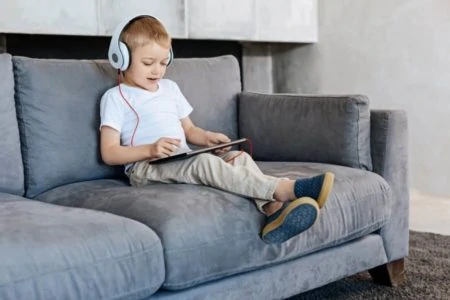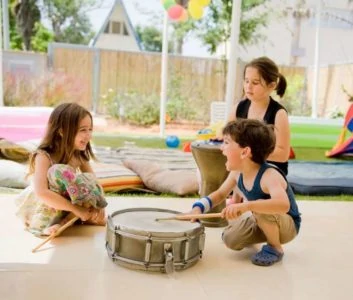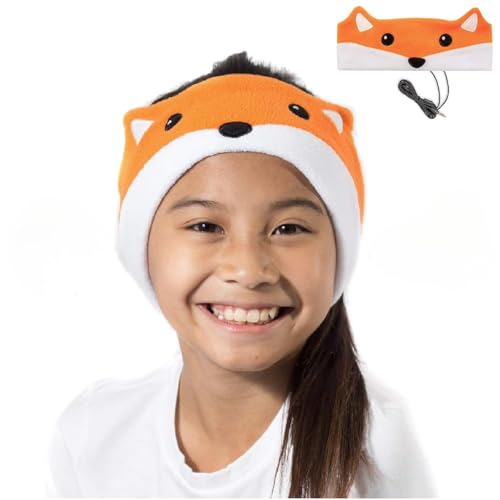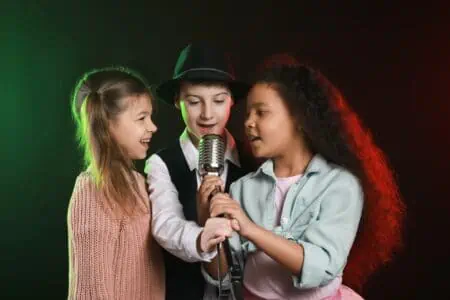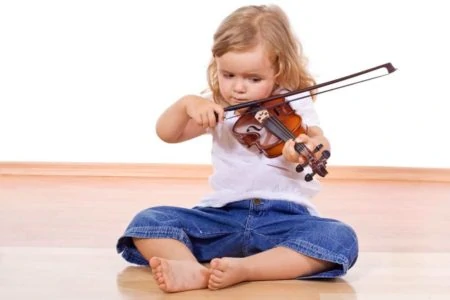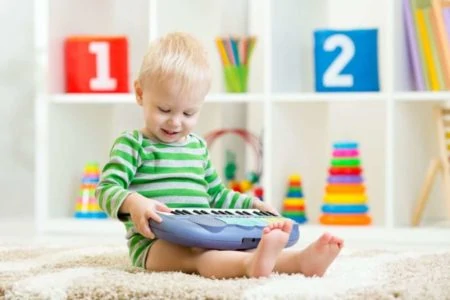Staring at your child’s noisy tablet? You probably think it is time for some headphones. I felt the same way when my oldest started watching shows in the living room.
But buying headphones for kids isn’t simple. Some claim to be “kid-safe” but still get dangerously loud. Others break the moment a toddler touches them.
We tested the top models to find the safest, most durable options. Here is everything you need to know to protect your child’s hearing while keeping the peace in your home.
- Decibel limitation
- Good noise-canceling ability
- Pinch-free hinges
- Flashing LED lights
- Excellent Bluetooth range
- Long battery life
- 35 millimeter universal plug
- Durable material
- Adjustable for different sizes
- Child-friendly technology
- Volume limitation
- Decent noise isolation
- Options for going wireless
- Decibel limitation
- Lightweight, padded ear cups
- Great price
- Suitable for young kids
- Good volume limit with hidden switch
Are Headphones Safe for Kids?
Headphones are a lifesaver for parents. They provide quiet time and keep kids entertained. However, safety is a major factor.
Prolonged exposure to high volumes weakens hearing. This applies to both adults and children.
Consistently high volume damages the eardrums. This can lead to hearing loss over time.
Research suggests roughly 10 million Americans suffer from noise-induced hearing loss (NIHL). This damage can happen after just one exposure to extreme volume.
Standard headphones can reach 100 decibels. Listening at this level for just 15 minutes a day causes permanent damage.
The volume should always stay under 85 decibels for children. Ideally, keep it at 75 decibels for toddlers. This minimizes the risk of injury.
Fortunately, you don’t have to ban headphones. You just need the right gear.
Many brands now offer volume-limiting technology. These headphones have built-in governors that prevent the sound from exceeding safe levels.
Headphones vs. Earbuds
Headphones and earbuds both deliver sound, but they function differently.
1. Headphones
Headphones rest on the outer ear.
“Supra-aural” models sit on top of the ear surface. They do not fully seal out noise. Your child will still hear you call their name.
“Circumaural” models fit over the entire ear. You might know these as noise-canceling headphones. They block out most background noise.
Headphones are generally safer. The sound source is further from the eardrum. However, volume control is still necessary.
2. Earbuds
Earbuds sit inside the ear canal. They are lightweight and portable.
However, earbuds increase the risk of hearing damage. The speaker sits directly next to the eardrum. This intensifies the sound pressure.
You can make earbuds safer by strictly limiting volume and usage time. We generally recommend over-ear headphones for younger children.
How to Choose Headphones for Kids
Consider these factors before clicking “buy.”
Product Reviews
We reviewed the market to find the safest and most durable options. Here are our top picks.
JLab JBuddies Over-Ear Headphones
Best Kids Over-Ear Headphones
JLab designed these headphones specifically for young listeners. The over-ear cups fit securely without pinching.
The headband adjusts to fit children aged 6 to 16. This longevity saves you money in the long run.
The eco-leather cushions provide excellent comfort. Your child can wear them for long car rides without complaints.
Most importantly, JLab includes an 85-decibel volume limiter. Your child can turn the volume dial up, but the output stays safe.
The only downside is the lack of wireless capability. You are tethered to the device.
Pros
- Adjustable design fits ages 6 to 16.
- Soft, comfortable ear cushions.
- Built-in volume limiter.
- Passive noise isolation.
- Pinch-free hinges prevent tears.
Cons
- No wireless option on this specific model.
Our Ratings
Riwbox WT-7S Bluetooth Headphones
Best Wireless Headphones for Kids
Riwbox brings the party with these wireless headphones. They come in vibrant colors that kids love.
The main attraction is the LED lighting. Red, blue, and green lights on the ear cups flash to the beat of the music. You can turn the lights off if they become distracting.
Bluetooth 5.0 ensures a stable connection. Pair them once, and they connect automatically next time. The range is impressive, allowing your child to move freely across the room.
Voice prompts alert you when the battery is low.
However, these lack a strict volume limiter. You must monitor the volume level closely, especially with younger children.
Pros
- Fun LED lights sync to music.
- Wireless freedom with good range.
- Long battery life.
- Comes in four color options.
Cons
- No built-in volume limit; requires supervision.
- Limited color palette for some preferences.
Our Ratings
Onanoff BuddyPhones Explore
Best Headphones for Toddlers
Onanoff created a winner for the toddler crowd. These headphones are tough, safe, and portable.
The frame uses a durable, flexible plastic. They withstand twisting and bending. The headband folds up for easy storage in a diaper bag.
Soft, padded ear cups protect sensitive ears. The cable includes a built-in splitter, so two kids can listen to one device.
Crucially, the volume is capped at 85 decibels. This non-negotiable limit protects hearing automatically.
Pros
- Foldable and highly durable.
- Built-in audio splitter for sharing.
- Comfortable padding.
- Strict 85-decibel limit.
- Includes stickers for customization.
Cons
- Connector plug can be bulky with some phone cases.
- Cable management requires attention.
Our Ratings
Elecder i37 Kids Headphones
Best Kids Headphones for iPad
The Elecder i37 is a durable workhorse for travel. The 59-inch cord is made of flexible, cloth-like material. It resists tangles and tugs.
These headphones fold down to a compact size. They fit easily into a backpack side pocket. The adjustable band fits a wide range of head sizes, from toddlers to adults.
The standard 3.5mm jack works with most tablets and iPads.
Note that this model does not have a volume limiter. It gets loud. You need to set the volume limit directly on the iPad or device settings.
Pros
- Durable, tangle-free cord.
- Compact, foldable design.
- Soft padded ear cups.
- Adjustable headband fits most ages.
- Multiple color combinations available.
Cons
- No built-in volume restriction.
- Standard audio jack may require a dongle for newer devices.
Our Ratings
Joysico Sport Earbuds
Best Earbuds for Kids
Joysico offers a solid in-ear option for older kids.
These earbuds are lightweight and ergonomic. They come with four different tip sizes, ensuring a decent fit for small ears. Memory foam tips add extra comfort.
The cable includes a volume slider. This helps keep sound levels reasonable, though it is not a hard lock.
The over-ear hook design keeps them in place during sports or activity.
Comfort varies with earbuds. Hard plastic can irritate the ear canal after a few hours. We recommend these for short sessions rather than all-day use.
Pros
- Includes four sizes of ear tips.
- Over-ear hooks prevent falling out.
- In-line volume control.
- Good passive noise isolation.
- Works with any standard audio jack.
Cons
- Can cause discomfort during long listening sessions.
- Even the smallest tip might be too big for some kids.
Our Ratings
CozyPhones Kids Ultra-Thin Speaker Headphones
Best Cute Kids Headphones
CozyPhones takes a different approach. Instead of plastic cups, they use a soft fleece headband.
Ultra-thin speakers sit inside the fabric band. You can remove them to wash the headband, which is a huge plus.
The “froggy” and other animal designs are adorable. The soft fabric is ideal for sleeping or travel. It doesn’t press against the ears like traditional headphones.
However, fleece gets warm. These aren’t great for hot summer days.
Positioning the speakers can be tricky. You need to align them perfectly with your child’s ears for clear sound.
Pros
- Extremely comfortable for sleeping.
- Washable headband (remove speakers first).
- Great for kids who hate the feel of plastic headphones.
- Stretchy fit suits many sizes.
Cons
- Can get sweaty in warm weather.
- Speakers can shift inside the band.
Our Ratings
Snug Play+ Kids Headphones
Best Kids Headphones for Gaming
Snug Play+ headphones are great for social kids and gamers.
They feature a built-in sharing port. You can daisy-chain multiple headphones together. This lets siblings watch the same movie or friends play a game together without extra splitters.
They are sized for kids aged three to eight but fit older children too.
The volume limit is 93 decibels. This is higher than the recommended 85 decibels. You should monitor usage time closely.
The cord is standard plastic. It isn’t reinforced, so teach your kids to handle it gently.
Pros
- Sharing port for multiple users.
- Foldable design for travel.
- Adjustable sizing.
- Wide variety of colors and prints.
Cons
- Volume limit (93dB) is higher than the recommended 85dB.
- Cord durability could be better.
Our Ratings
LilGadgets Connect+ Pro Premium Headphones
Best Noise Canceling Headphones for Kids
LilGadgets delivers a premium feel with the Connect+ Pro.
The padded ear cups provide excellent passive noise cancellation. They physically block out background noise, which helps kids focus.
These headphones utilize a SharePort technology. You can connect multiple headphones to one device easily.
The volume limit sits at 93 decibels. While safer than standard adult headphones, it exceeds the ideal 85-decibel threshold.
The sizing runs large. These are not for toddlers; they fit children aged 6 and up best.
Pros
- Effective passive noise cancellation.
- SharePort technology included.
- Volume limitation (93dB).
- Stylish colors and patterns.
- Lightweight and comfortable.
Cons
- Too big for toddlers or small heads.
- Volume limit is higher than the safest standard.
- Hinges require gentle handling.
Our Ratings
MEE Audio Kid Jamz Headphone
Best Cheap Headphones for Kids
MEE Audio Kid Jamz proves you don’t need to spend a fortune for safety.
These headphones fit kids aged 4 to 12. The headband is incredibly flexible. It twists and bends without snapping, which is great for destructive phases.
The volume limiter is set to 85 decibels. However, MEE Audio added a clever feature: a hidden switch. You can disable the limiter if the environment is too loud (like on a plane). The switch is hard for kids to find, keeping parents in control.
The ear pads are comfortable, though the foam can detach over time. A little glue fixes this quickly.
Pros
- Excellent value for money.
- Hypoallergenic, BPA-free materials.
- Volume limiter with a hidden bypass switch.
- Highly flexible headband.
Cons
- Ear cushion foam may loosen with heavy use.
- Sound quality is average.
